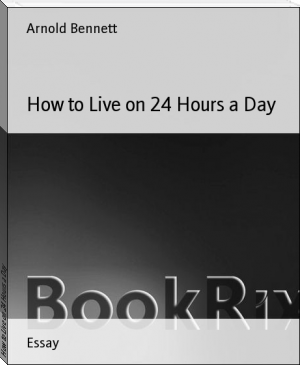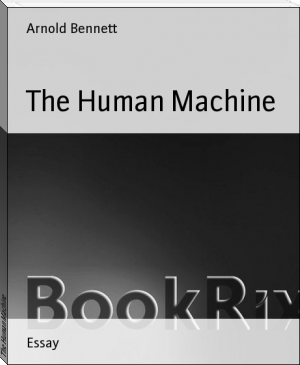The Author's Craft - Arnold Bennett (knowledgeable books to read TXT) 📗

- Author: Arnold Bennett
Book online «The Author's Craft - Arnold Bennett (knowledgeable books to read TXT) 📗». Author Arnold Bennett
CONTENTS
PART I.
SEEING LIFE
PART II.
WRITING NOVELS
PART III.
WRITING PLAYS
PART IV.
THE ARTIST AND THE PUBLIC
PART I
SEEING LIFE
I
A young dog, inexperienced, sadly lacking in even primary education, ambles and frisks along the footpath of Fulham Road, near the mysterious gates of a Marist convent. He is a large puppy, on the way to be a dog of much dignity, but at present he has little to recommend him but that gawky elegance, and that bounding gratitude for the gift of life, which distinguish the normal puppy. He is an ignorant fool. He might have entered the convent of nuns and had a fine time, but instead he steps off the pavement into the road, the road being a vast and interesting continent imperfectly explored. His confidence in his nose, in his agility, and in the goodness of God is touching, absolutely painful to witness. He glances casually at a huge, towering vermilion construction that is whizzing towards him on four wheels, preceded by a glint of brass and a wisp of steam; and then with disdain he ignores it as less important than a mere speck of odorous matter in the mud. The next instant he is lying inert in the mud. His confidence in the goodness of God had been misplaced. Since the beginning of time God had ordained him a victim.
An impressive thing happens. The motor-bus reluctantly slackens and stops. Not the differential brake, nor the foot-brake, has arrested the motor-bus, but the invisible brake of public opinion, acting by administrative transmission. There is not a policeman in sight. Theoretically, the motor-'bus is free to whiz onward in its flight to the paradise of Shoreditch, but in practice it is paralysed by dread. A man in brass buttons and a stylish cap leaps down from it, and the blackened demon who sits on its neck also leaps down from it, and they move gingerly towards the puppy. A little while ago the motor-bus might have overturned a human cyclist or so, and proceeded nonchalant on its way. But now even a puppy requires a post-mortem: such is the force of public opinion aroused. Two policemen appear in the distance.
"A street accident" is now in being, and a crowd gathers with calm joy and stares, passive and determined. The puppy offers no sign whatever; just lies in the road. Then a boy, destined probably to a great future by reason of his singular faculty of initiative, goes to the puppy and carries him by the scruff of the neck, to the shelter of the gutter. Relinquished by the boy, the lithe puppy falls into an easy horizontal attitude, and seems bent upon repose. The boy lifts the puppy's head to examine it, and the head drops back wearily. The puppy is dead. No cry, no blood, no disfigurement! Even no perceptible jolt of the wheel as it climbed over the obstacle of the puppy's body! A wonderfully clean and perfect accident!
The increasing crowd stares with beatific placidity. People emerge impatiently from the bowels of the throbbing motor-bus and slip down from its back, and either join the crowd or vanish. The two policemen and the crew of the motor-bus have now met in parley. The conductor and the driver have an air at once nervous and resigned; their gestures are quick and vivacious. The policemen, on the other hand, indicate by their slow and huge movements that eternity is theirs. And they could not be more sure of the conductor and the driver if they had them manacled and leashed. The conductor and the driver admit the absolute dominion of the elephantine policemen; they admit that before the simple will of the policemen inconvenience, lost minutes, shortened leisure, docked wages, count as less than naught. And the policemen are carelessly sublime, well knowing that magistrates, jails, and the very Home Secretary on his throne--yes, and a whole system of conspiracy and perjury and brutality--are at their beck in case of need. And yet occasionally in the demeanour of the policemen towards the conductor and the driver there is a silent message that says: "After all, we, too, are working men like you, over-worked and under-paid and bursting with grievances in the service of the pitiless and dishonest public. We, too, have wives and children and privations and frightful apprehensions. We, too, have to struggle desperately. Only the awful magic of these garments and of the garter which we wear on our wrists sets an abyss between us and you." And the conductor writes and one of the policemen writes, and they keep on writing, while the traffic makes beautiful curves to avoid them.
The still increasing crowd continues to stare in the pure blankness of pleasure. A close-shaved, well-dressed, middle-aged man, with a copy of _The Sportsman_ in his podgy hand, who has descended from the motor-bus, starts stamping his feet. "I was knocked down by a taxi last year," he says fiercely. "But nobody took no notice of _that_! Are they going to stop here all the blank morning for a blank tyke?" And for all his respectable appearance, his features become debased, and he emits a jet of disgusting profanity and brings most of the Trinity into the thunderous assertion that he has paid his fare. Then a man passes wheeling a muck-cart. And he stops and talks a long time with the other uniforms, because he, too, wears vestiges of a uniform. And the crowd never moves nor ceases to stare. Then the new arrival stoops and picks up the unclaimed, masterless puppy, and flings it, all soft and yielding, into the horrid mess of the cart, and passes on. And only that which is immortal and divine of the puppy remains behind, floating perhaps like an invisible vapour over the scene of the tragedy.
The crowd is tireless, all eyes. The four principals still converse and write. Nobody in the crowd comprehends what they are about. At length the driver separates himself, but is drawn back, and a new parley is commenced. But everything ends. The policemen turn on their immense heels. The driver and conductor race towards the motor-bus. The bell rings, the motor-bus, quite empty, disappears snorting round the corner into Walham Green. The crowd is now lessening. But it separates with reluctance, many of its members continuing to stare with intense absorption at the place where the puppy lay or the place where the policemen stood. An appreciable interval elapses before the "street accident" has entirely ceased to exist as a phenomenon.
The members of the crowd follow their noses, and during the course of the day remark to acquaintances:
"Saw a dog run over by a motor-bus in the Fulham Road this morning! Killed dead!"
And that is all they do remark. That is all they have witnessed. They will not, and could not, give intelligible and interesting particulars of the affair (unless it were as to the breed of the dog or the number of the bus-service). They have watched a dog run over. They analyse neither their sensations nor the phenomenon. They have witnessed it whole, as a bad writer uses a _cliche_. They have observed--that is to say, they have really seen--nothing.
II
It will be well for us not to assume an attitude of condescension towards the crowd. Because in the matter of looking without seeing we are all about equal. We all go to and fro in a state of the observing faculties which somewhat resembles coma. We are all content to look and not see.
And if and when, having comprehended that the _role_ of observer is not passive but active, we determine by an effort to rouse ourselves from the coma and really to see the spectacle of the world (a spectacle surpassing circuses and even street accidents in sustained dramatic interest), we shall discover, slowly in the course of time, that the act of seeing, which seems so easy, is not so easy as it seems. Let a man resolve: "I will keep my eyes open on the way to the office of a morning," and the probability if that for many mornings he will see naught that is not trivial, and that his system of perspective will be absurdly distorted. The unusual, the unaccustomed, will infallibly attract him, to the exclusion of what is fundamental and universal. Travel makes observers of us all, but the things which as travellers we observe generally show how unskilled we are in the new activity.
A man went to Paris for the first time, and observed right off that the carriages of suburban trains had seats on the roof like a tramcar. He was so thrilled by the remarkable discovery that he observed almost nothing else. This enormous fact occupied the whole foreground of his perspective. He returned home and announced that Paris was a place where people rode on the tops of trains. A Frenchwoman came to London for the first time--and no English person would ever guess the phenomenon which vanquished all others in her mind on the opening day. She saw a cat walking across a street. The vision excited her. For in Paris cats do not roam in thoroughfares, because there are practically no houses with gardens or "areas"; the flat system is unfavourable to the enlargement of cats. I remember once, in the days when observation had first presented itself to me as a beautiful pastime, getting up very early and making the circuit of inner London before summer dawn in quest of interesting material. And the one note I gathered was that the ground in front of the all-night coffee-stalls was white with egg-shells! What I needed then was an operation for cataract. I also remember taking a man to the opera who had never seen an opera. The work was _Lohengrin_. When we came out he said: "That swan's neck was rather stiff." And it was all he did say. We went and had a drink. He was not mistaken. His observation was most just; but his perspective was that of those literary critics who give ten lines to pointing out three slips of syntax, and three lines to an ungrammatical admission that the novel under survey is not wholly tedious.
But a man may acquire the ability to observe even a large number of facts, and still remain in the infantile stage of observation. I have read, in some work of literary criticism, that Dickens could walk up one side of a long, busy street and down the other, and then tell you in their order the names on all the shop-signs; the fact was alleged as an illustration of his great powers of observation. Dickens was a great observer, but he would assuredly have been a still greater observer had he been a little less pre-occupied with trivial and unco-ordinated details. Good observation consists not in multiplicity of detail, but in co-ordination of detail according to a true perspective of relative importance, so that a finally just general impression may be reached in the shortest possible time. The skilled observer is he who does not have to change his mind. One has only to compare one's present adjusted impression of an intimate friend with one's first impression of him to perceive the astounding inadequacy of one's powers of observation. The man as one has learnt to see him is simply not the same man who walked into one's drawing-room on the day of introduction.
There are, by the way, three sorts of created beings





Comments (0)